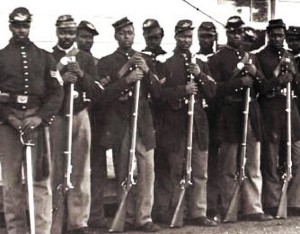December began with the Rumsey’s Minstrels performing at Masonic Hall which provided a diversion to the citizens of Indianapolis from accounts of the Battles of Chattanooga – Missionary Ridge, Wauhatchie, and Lookout Mountain. These contests were “proven to be among the most successful ones of the war,” but the accompanying list of Hoosier casualties that filled the pages of the Journal touched homes throughout the state. Indiana obtained the authority to recruit colored troops, and no longer will its colored citizens, “anxious to serve their country,” have to go to Michigan, Massachusetts, or elsewhere to find regiments into which they may be enlisted. Rev. William Revells and Mr. Silas Shucraft were authorized by Gov. Morton to recruit a colored battalion. The Indiana Branch of the U. S. Christian Commission reported the receipt of several hundred “comfort bags…filled with thread, needles, pins, buttons, and other articles so useful to our soldiers far from home” provided by the Indianapolis Sabbath Schools. Commission delegates distributed these “comfort bags, and some other things…to our brave soldiers on the battlefield, in camp, and in hospitals.”
Masonic Hall was also the site of the “largest and most enthusiastic war meeting of the year.” Gov. Morton was joined by Robert Dale Owen and others in calling for “another grand effort of the people” to raise volunteers to meet the county’s quota of 701 men before the draft. Meetings were also held throughout the city wards – “there must be volunteers or there will be a heavy draft” – as a list of all persons subject to the January 5, 1864 draft appeared in the Journal. At a war meeting held at the Bethel Church in Warren Township chaired by Daniel Shearer, a resolution was adopted to “pay a bounty (enlistment bonus) of fifty dollars (2012: $919.25) to each recruit…until the township’s quota is filled.” The Mayor issued a proclamation calling on the “people of this city…to suspend business” on two afternoons “for the purpose of uniting their efforts to raise the balance of the city’s quota of volunteers,” but it “was not generally observed.” Some believed if one or two wards have met their quotas “there is no doubt but all will do so without further encouragement.” The General Court Martial sessions continued in the city with a number of soldiers being found guilty on charges that included disobedience to orders, drunkenness and disorderly conduct, absence without leave, and desertion. Sentences ranged from having the offender’s head shaved and being drummed out of camp to the offender’s confinement at “hard labor with ball and chain, weighing 25 lbs. attached to his leg.”
At a special meeting of the city council on Friday, December 11, an ordinance was adopted authorizing the Indianapolis Street Railroad Co to construct tracks and operate cars “with animal power only” on designated streets of Indianapolis. The company objected to certain conditions and declined the charter. The council then authorized Mayor John Caven to telegraph R. B. Catherwood of Brooklyn, New York, whose Citizens’ Street Railway Company had also been under consideration, and offer the charter to him. In response to the “frequent robberies, knockdowns, burglaries, etc, which have so disgraced our city of late,” the council gave the mayor authority to hire additional detectives.
While city merchants prepared their shops with holiday wares, the German-English School Fair was held for the benefit of the school at Washington Hall, 78 W. Washington St. Tables were arranged with an extensive display of sale items including school supplies, “toys in endless variety of style, size and price, dolls, large and small, plain and costly; cakes, candies, flowers, articles of clothing for children,” and a large assortment of Christmas ornaments. The city’s butchers announced that a “grand show of fine meats” would be available at the East Market House on Christmas Eve and Christmas morning with “some rare ‘cuts’ for Christmas dinners.” On December 22, a “large company” of New Englanders and others in the city gathered at the Congregational Church to celebrate Forefathers’ Day with “music, speeches and refreshments.” Three days later Christmas was a “beautiful day, and the streets were filled with children and happy people in holiday attire.” Policemen arrested fifteen or twenty “very jolly fellows” for intoxication.
The Monday after Christmas found the State Teachers’ Association holding its annual meeting at the State House in the hall of the House of Representatives as holiday crowds either filled Metropolitan Hall to be entertained by the romantic drama, The Motto of the Duke or were spellbound by the “life-like representations” of the most historic and romantic global scenes “covering over seventy thousand yards of canvas” in the beautiful exhibition of “Wolfenberger’s Hundred Mirrors of the World” at the Masonic Hall.



